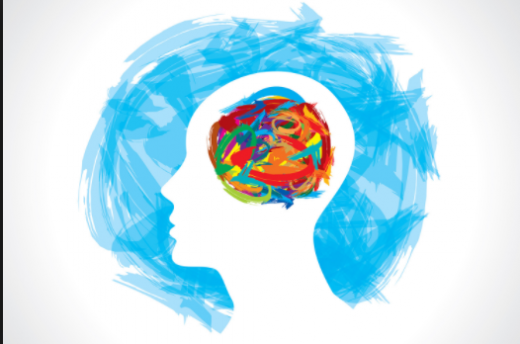The era of empty acceptance
One WSS reporter recounts her experience in attempting to cope with mental illness in a still stigmatized world.

An artist’s rendering of the inside of the mind
April 4, 2018
I’ve been seeing a therapist since August 2017. When I mention this to people, I usually see their eyes widen for a second before they catch themselves and try to act like they don’t have a million questions. Are you alright? What happened to you? Are you dealing with some sort of giant burden from years and years of childhood trauma?
The truth of the matter is, I’m no different from the next teenager. I try hard in school, I go out on the weekends with my friends and I check Twitter whenever I possibly can. I just also happen to take 15 milligrams of an antidepressant every evening and meet with my cool therapist/friend for an hour every other week. The only major difference here is that sometimes my brain needs a little more help to stay in a healthy place.
I started to realize my brain worked in an abnormal way around eighth grade. More and more often, I would find myself getting incredibly anxious about things that didn’t seem to matter to other people. That would send me to a dark, lonely place where I’d have to live in until potentially days later when I would start feeling fine again.
I knew I didn’t have to be living like this, but I was terrified to speak up about the issues I’d been dealing with. I had seen all of the typical guidance programing in school and the media I saw told me it was okay to seek help when you need it, but I just didn’t feel like that was the world I was living in. I noted that this “era of acceptance” we’d been told we were living in contained far too many empty promises.
Despite there being plenty of effective, accessible treatments, there are often huge gaps of time between the first appearance of mental illness symptoms and when people actually get help. A study by the National Alliance on Mental Illness showed that approximately half of all chronic mental illness begins by the time a person turns 14, and that number rises to ¾ by age 24. This means that although many young people may struggle with mental health issues during their young adulthood, far too many of those people choose to go untreated.
The stigma around the topic of mental health is still alive and well. According to a Duke University study, more than half of teenagers with psychiatric disorders receive no sort of treatment at all. These teens are so afraid of judgment from the world around them, or worse, that no one would take their concerns seriously, that they’d rather just suffer in silence.
So how do we fix this major problem? We talk about mental illness. It’s that simple. But Lucy, don’t we already do that? While we’ve started discussing the issue of mental illness, whether it be in schools or online, we’ve hardly scratched the surface. Our society needs to start taking time to educate its youth in the different forms that mental illness takes and what types of resources people of all ages can access when they need help through open and honest conversation about the actual realities of mental illness.
Since my diagnosis with general depression and anxiety, I’ve started to try to talk about my own experiences as frequently as I’m comfortable with. I try to casually mention my therapist in conversation or tweet out a joke about something strange my brain is doing that day. Normalizing the idea of mental illness helps young people understand they aren’t broken just because a part of their brain may work in a different way than someone else’s.
West High in particular has many resources available to struggling students that are within the reach of many families, such as access to therapists/psychiatrists and various clubs that discuss difficult topics such as mental illness. Destigmatizing mental illness is so important for the further progression of society. No one should have to go about their life feeling like there’s no hope.






Micah Brodsky • Apr 5, 2018 at 5:31 pm
I relate so much to this, thank you so much for sharing this Lucy